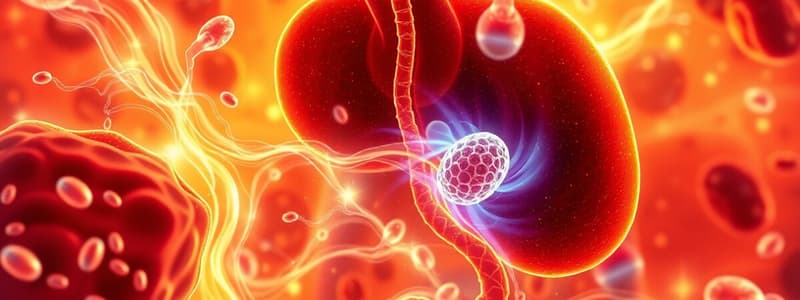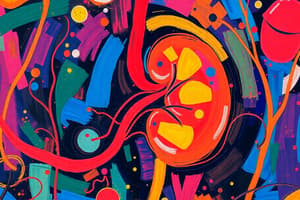Podcast
Questions and Answers
What best defines the process of drug excretion?
What best defines the process of drug excretion?
- A process whereby drugs or metabolites are transferred to the external environment (correct)
- A method for enhancing drug effectiveness in the body
- A mechanism for drug storage in the liver
- A process that regulates drug absorption in the intestine
Which of the following types of elimination involves removing drugs via urine?
Which of the following types of elimination involves removing drugs via urine?
- Cellular elimination
- Hepatic elimination
- Renal elimination (correct)
- Amino acid transport
What role do ABC transporters play in drug secretion?
What role do ABC transporters play in drug secretion?
- They facilitate drug absorption in the intestine
- They mediate drug secretion to the filtrate (correct)
- They store drugs in the liver
- They enhance drug interaction with cellular receptors
Which means of drug excretion involves the liver and bile?
Which means of drug excretion involves the liver and bile?
What happens to drugs that are reabsorbed after filtration in the kidneys?
What happens to drugs that are reabsorbed after filtration in the kidneys?
Which percentage of blood flow is typically associated with renal drug excretion?
Which percentage of blood flow is typically associated with renal drug excretion?
What process describes the initial filtration of plasma in the kidneys?
What process describes the initial filtration of plasma in the kidneys?
What is the primary route of drug excretion through the lungs?
What is the primary route of drug excretion through the lungs?
What occurs with drugs that enter the bile from the liver?
What occurs with drugs that enter the bile from the liver?
During drug excretion, what process allows for the passive return of drugs from the renal tubules to the blood?
During drug excretion, what process allows for the passive return of drugs from the renal tubules to the blood?
Flashcards are hidden until you start studying
Study Notes
Drug Excretion
- Drug excretion is the irreversible transfer of drugs or metabolites from the internal environment to the external environment.
- This can occur through renal or non-renal routes.
Types of Elimination
- Cellular: This type of elimination involves ABC transporters, such as P-glycoprotein/MDR1.
- Renal: Approximately 25% of blood flows through the kidneys, making this route a significant pathway for drug excretion in urine.
- Hepatic: Drugs can be transported from the liver into bile, entering the duodenum and subsequently excreted in feces.
Renal Drug Excretion Phases
- Filtration: Plasma is filtered through the glomerulus, allowing most molecules, including drugs, to enter the filtrate.
- Active Tubular Secretion: ABC transporters actively move selected drugs into the filtrate.
- Reabsorption: Some drugs passively diffuse back into the bloodstream from the filtrate.
- Elimination: Remaining drugs in the filtrate are collected in the bladder and excreted in urine.
Other Means of Drug Excretion
- Biliary Excretion: Drugs can be eliminated through bile, passing from the liver to the intestine and eventually excreted in feces.
- Milk Excretion: Some drugs can be transferred into breast milk, potentially exposing infants to their effects.
- Pulmonary Excretion: Gas-soluble drugs can be eliminated through respiration, exhaled from the lungs with breath.
Studying That Suits You
Use AI to generate personalized quizzes and flashcards to suit your learning preferences.




